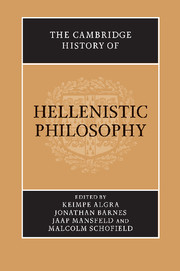Book contents
- Frontmatter
- PART I INTRODUCTION
- PART II LOGIC AND LANGUAGE
- PART III EPISTEMOLOGY
- PART IV PHYSICS AND METAPHYSICS
- 11 Hellenistic physics and metaphysics
- 12 Cosmology
- 13 Theology
- 14 Explanation and causation
- 15 Determinism and indeterminism
- 16 Epicurean psychology
- 17 Stoic psychology
- 18 Philosophy, science and medicine
- PART V ETHICS AND POLITICS
- Synopsis of principal events
- Editions of sources and fragments
- List of abbreviations
- Bibliography
- Index locorum
- General Index
- References
12 - Cosmology
from PART IV - PHYSICS AND METAPHYSICS
Published online by Cambridge University Press: 28 March 2008
- Frontmatter
- PART I INTRODUCTION
- PART II LOGIC AND LANGUAGE
- PART III EPISTEMOLOGY
- PART IV PHYSICS AND METAPHYSICS
- 11 Hellenistic physics and metaphysics
- 12 Cosmology
- 13 Theology
- 14 Explanation and causation
- 15 Determinism and indeterminism
- 16 Epicurean psychology
- 17 Stoic psychology
- 18 Philosophy, science and medicine
- PART V ETHICS AND POLITICS
- Synopsis of principal events
- Editions of sources and fragments
- List of abbreviations
- Bibliography
- Index locorum
- General Index
- References
Summary
Introduction: the fourth-century legacy
By the time of the death of Aristotle, there was some measure of agreement among educated Greeks about the nature of the cosmos. The word cosmos itself soon acquired a canonical meaning. Aristotle used it in its wider sense to mean ‘good order’ or ‘elegance’, but in the context of the study of the natural world he used it as a synonym for ouranos, thinking particularly of the heavens and their orderly movements. But the word was defined by the Stoic Chrysippus as a ‘system of heaven and earth and the natures contained in these’ (Ar. Did. fr. 31 ap. Stob. I.184.8–10), and this is a definition that reappears, sometimes with small variations, fairly frequently. It is repeated by the Peripatetic author of the treatise On the Cosmos attributed to Aristotle (391b9). The Epicurean definition was not significantly different (Ep. Epistula ad Pythoclem 88).
From the start this definition marks a difference between the classical use of the word and our own in the twentieth century. The ancient use of the word leaves open the possibility that the cosmos in which we live is only a part of the universe. A cosmos is a limited system, bounded on its periphery by the heavens: what lay beyond the heavens of our cosmos, if anything, was open to debate. This chapter will therefore be careful to preserve the distinction between the cosmos and the universe.
Aristotle had already provided arguments to show that the earth does not move and occupies a position at the centre of the cosmos (In Aristotelis De caelo commentaria II. 14).
- Type
- Chapter
- Information
- The Cambridge History of Hellenistic Philosophy , pp. 412 - 451Publisher: Cambridge University PressPrint publication year: 1999
References
- 17
- Cited by



